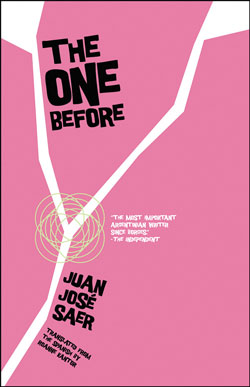The One Before
by Juan José Saer
reviewed by Lucas Cuatrecasas
Among the Southern Cone notables who have written in the shadow of Borges—Ricardo Piglia, César Aira, Roberto Bolaño—Juan José Saer is a shrewd iconoclast. Half of the time, he behaves like a textbook example of this genre of Latin American abstraction, and the other half like a recluse unwilling to leave his perfectly self-contained world. Here, as in his other work, most of his narrators are philosophical hermits, mistrustful of anything but the immediate, ambient present, and their skepticism floods even the most quotidian realities with doubt. Any reader of the final and eponymous story of The One Before will sense this as Saer directly recalls the narrator in Proust’s Remembrance of Things Past, no sooner having soaked his famous madeleine in tea than he’s overcome by irrepressible sensory memories: “Earlier, others could… they would wet, slowly, in the kitchen, in the afternoon, in the winter, the cookie… and they knew immediately when they tasted it, that they were full, inside of something and carrying, inside, something they had, in other years… abandoned.” But, somewhat tragically, when this story’s narrator bites his wet cookie a half-century after Proust, he tastes nothing, recalls nothing.
Beyond shifting modes of literary expression, it’s tempting to point out that The One Before appeared first in 1976, the year of the military coup d’état that knocked Saer’s native Argentina into political amnesia, for who could think of anything but the grim present? Yet Saer mocks this empirical blindness. In prose so cluttered with admissions of inexactitude—“so to speak,” “if you will”—that it often seems as if his words are grinding to a bureaucratic halt, he forces us to notice the infinite elisions, all the other voices gone unheard, incurred by each linguistic choice he makes. But storytelling that favors immediacy at the expense of discernible movement both exhilarates and exhausts the reader. The narrator’s gaze always fixes on the ludic strangeness of the surrounding mundanity, and the descriptions are fiendish:
Now I am taking off my white pullover, I am still taking off the white pullover… I see the illuminated room through the thick knit of wool which transforms the whole space into a grid, pockmarked, really, with luminous points and black ones…. There is, it seems, something that would like, so to speak, to come. It seems.
This is Saer doing what he does best, pinning down the fluid transformations of the moment, charting the yawning void between received experience and the accretion of new memories, that which seems to want to come. This in-between space has analogues throughout. In “Argument over the Term ‘Zone’” Saer reminds us that nothing but conceptual convenience separates one swath of land from another. Likewise, the narrator of “The Interpreter,” an indigene who learns the language of the colonizing “butchers,” agonizes over the distance his tongue bridges—“two oceans joining, an ocean of blood and a foreign ocean of black water…” Here, translating and remembering are of the same species of unavoidable deceit.
In fact, so much of Saer’s fiction happens in this languorous threshold between experience and awareness, between what is sediment and what has yet to settle, that when the realization of lived experience hits, it’s thrilling: finality comes down on the story like a hammer, sending the reader reeling back like a manic Proust. This is exactly what happens in “Half-Erased” when the deftly named Pigeon Garay (Pichón in the Spanish) notices an aerial view of himself and his friend from earlier that day on television; the part of him that the image preserves is a part that he no longer owns. Instead, it belongs to the regime of the knowable, recallable past, which is so recondite as to be impossible to track down: “a region even more remote than the whole world inside ourselves,” or “more remote… than the very outskirts of the universe.”
These instances represent two distinct facets of the same idea and demonstrate how Saer is constantly reformulating his conclusions and restating his assumptions, like an analytic philosopher under pressure. For Saer, who left behind a fractured Argentina only to ceaselessly reinvent it in writing, memory is a luxury belonging to those who don’t overthink it. For everyone else, only the textual here-and-now is certain. Someone, somewhere, is listlessly dipping cookies in tea.
Published on December 21, 2015

